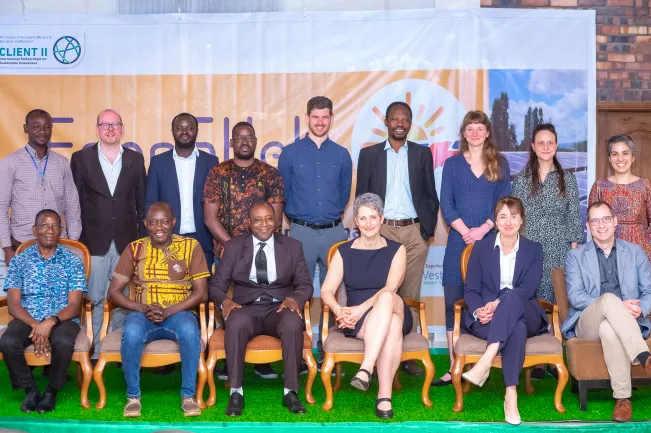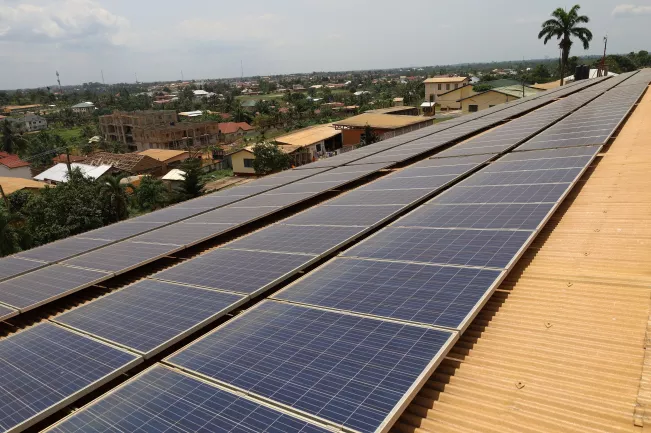Communications and Marketing
Solar energy for more security of supply: Research project proves potential of photovoltaics for health facilities in Ghana
The research results of the EnerSHelF project (Energy Self-Sufficiency for Health Facilities in Ghana) prove the potential of photovoltaic systems and show which technical, political and social factors promote or hinder a sustainable energy transition in the African state. Furthermore, the interdisciplinary approach can serve as a model for similar projects in the future.
In Ghana, as in many other developing and emerging countries, power cuts are so commonplace that there is even a word for them. In various dialects of the Akan language, which is spoken by about nine million people in Ghana, "dumsor" refers to a continuous, irregular and unpredictable power cut. These outages and the general instability of the power grid are associated with great risks, especially for health facilities. Medicines can no longer be refrigerated or life-saving medical equipment fails.

The EnerSHelF project team, consisting of experts from the engineering and natural sciences as well as development economics, began its work with topics that the World Health Organisation (WHO) sees as important building blocks on the path to a sustainable future: "The energy supply of health facilities links two of the WHO's 17 development goals with each other. This so-called health-energy nexus makes our project interesting for similar projects in other developing and emerging countries," says Professor Katja Bender, who led the project jointly with Professor Stefanie Meilinger. Both researchers work at the International Centre for Sustainable Development (IZNE) at Hochschule Bonn-Rhein-Sieg.
The results in detail
The project partners conclude that there is potential for photovoltaic solutions in Ghana. The investment seems particularly suitable for private operators of smaller health facilities. Due to the unreliability of the electricity grid, most of these centres currently rely on diesel generators to ensure the supply of patients. Photovoltaic solutions with a connected battery storage system could help to ensure a permanent power supply in the future and at the same time contribute to sustainability.

How this can work can be seen in Akwatia in the south of the country. Here, a photovoltaic system supplies a rural hospital with electricity. Even after the end of the project, it will remain in operation. However, the system does not serve as a blueprint for a successful power supply: "Every place and every institution has special requirements. Therefore, an important part of the project was to analyse the given weather and climate conditions in detail and to provide energy meteorological weather forecasts in Ghana for the first time and to use them for system control. We now have a better understanding of the conditions that need to be met for successful operation of photovoltaic systems," says Professor Stefanie Meilinger.
These findings have resulted in, among other things, several planning tools that will make it easier in the future to identify the specific needs and role of health facilities for rural electrification, also involving the surrounding communities, and to better manage and maintain the facilities.
Photovoltaic systems could thus contribute to a more secure and sustainable power supply in the Ghanaian health sector in the future. In addition to questions of financing, it is important that operating companies develop solutions tailored to the needs of the facilities together with local partners, the researchers recommend.
The team
The team in the EnerSHelF project consists of scientists from the International Centre for Sustainable Development (IZNE) at Hochschule Bonn-Rhein-Sieg, the Cologne Institute for Renewable Energy (CIRE) at TH Köln, the Institute for Geography at the University of Augsburg (IGUA), the Reiner Lemoine Institute (RLI), the West African Science Service Center on Climate Change and Adapted Land Use (WASCAL), the University for Development Studies (UDS) in Tamale/Ghana, The Brew-Hammond Energy Centre (TBHEC) at the Kwame Nkrumah University of Science and Technology (KNUST) in Kumasi/Ghana, as well as the industrial partner WestfalenWIND Beyond and the network partner European Association of Development Research and Training Institutes (EADI). On site, the researchers cooperated with St. Dominic's Hospital in Akwatia, St. Michaels' Hospital in Kumasi and the Kologo Health Centre in Kologo.
Press photos for download


Contact

Katja Bender
Professor of Economics, esp. Economic & Social Development, Vice Dean for Research, Transfer and Internationalization, Director International Center for Sustainable Development, Deputy President European Association for Development Research and Training Institutes (EADI)
Research fields
Location
Sankt Augustin
Room
F 306
Address
Grantham-Allee 20
53757, Sankt Augustin
Telephone
+49 2241 865 9660
Stefanie Meilinger
Professor for Sustainable Technologies, esp. Energy Efficiency and Renewable Energies, Director of the International Centre for Sustainable Development (IZNE), Department Engineering and Communication (IWK)
Research fields
Location
Sankt Augustin
Room
F 321
Address
Grantham-Allee 20
53757 Sankt Augustin
Telephone
+49 2241 865 718